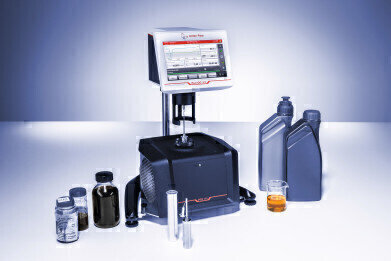Analytical Instrumentation
Standard Compliance with Anton Paar’s Viscometers
May 17 2022
The question of standards is an important one. Complying to standards is critically important to ensure that only safe and standardized products enter the market. This makes business operations run more smoothly by ensuring they follow the Good Manufacturing Practices (GMP) recommended by regulatory agencies. Setting guidelines for businesses to follow, moreover, helps them avoid reputation loss and costly legal consequences that could occur from faulty products, while also ensuring only innovative and effective products are brought to market.
Standards for Kinematic Viscometers
ASTM D7042
Anton Paar’s SVM kinematic viscometers make measuring kinematic viscosity according to ASTM D7042 easy. This test method is an accepted alternative to conventional D445 capillary viscometry for fast and economical measurement of kinematic viscosity over a wide temperature range. It requires less sample, less solvent, and much less energy, which saves you time and costs for these types of measurements. Its environmental footprint is also smaller. You can measure a wide variety of samples without having to change capillaries with D7042. Furthermore, D7042 is referenced in a multitude of national and international standards and product specifications, such as: SAE J300, ASTM D2270, ASTM D396, ASTM D975, ASTM D1655, ASTM D6751, ASTM D7467, JIG AFQRJOS, and ISO 23581.
ASTM D445 bias corrections
SVM is also the only kinematic viscometer on the market that delivers compliant results in both ASTM D7042 and D445. Several years of ASTM interlaboratory studies resulted in bias statements for a wide variety of samples (e.g., jet fuels, diesel and biodiesel fuels, fuel oils, formulated oils, and residual fuels). These bias corrections have been implemented in the SVM, so you enjoy all the benefits that come with our SVM smart viscometers and can report your results in both D7042 and D445.
ASTM D2270
By simultaneously measuring in two separate measuring cells at two different temperatures and automatically calculating the viscosity index, SVM 4001 provides determination of viscosity index according to ASTM D2270. This saves you time and reduces operating cost up to 50 % due to low sample, solvent, and energy consumption.
Find out more on our website.
Standards for Rotational Viscometers
Anton Paar’s stand-alone rotational viscometer, ViscoQC, in combination with the powerful Peltier temperature device PTD 175, fulfills the requirements of temperature scanning tests according to ASTM D5133 and D7110 to measure apparent viscosity of fresh, sooted, or highly oxidized engine oils at low temperatures, and automatically generates the critical gelation index to predict the low-temperature pumpability problems that can lead to engine failure.
When combined with the PTD 175, you can also use ViscoQC for running automated, low-temperature viscosity test for ATF, hydraulic fluids, and gear oils in accordance with ASTM D2983 and D8210. While automation reduces the hands-on time needed to prepare and run a D2983 viscosity test, it also improves test precision. Integrating all conditioning and testing processes in a self-contained unit eliminates the temperature fluctuation and result variability associated with sample transfer and disruption.
In addition, the multipurpose functionality of ViscoQC and the unmatchable broad temperature range of PTD 175 from -45 °C to +175 °C facilitates tests on bitumen and asphalt binder according to ASTM D4402, DIN 13302 or AASHTO T316.
Find out more on our website.
Digital Edition
PIN 25.3 June/July
June 2024
Analytical Instrumentation - Recent Advances In Various Bench Scale Accelerated Oxidative Testing Methods For Fuels - Petrochemical Industry: Anton Paar Solutions Streamline Processes, Reduce H...
View all digital editions
Events
Jul 30 2024 Jakarta, Indonesia
Jul 30 2024 Jakarta, Indonesia
China Energy Summit & Exhibition
Jul 31 2024 Beijing, China
Jul 31 2024 Chengdu, China
Aug 05 2024 Moon Township, PA, USA


















